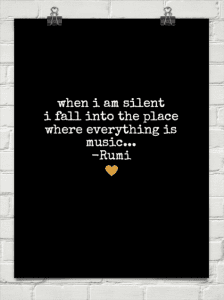There is, monks, an unborn, unbecome, unmade, uncompounded. If there were not this unborn… then there would be no deliverance here visible form what is born, become, made, compounded. But sincere there is an unborn, unbecome, unade, uncompounded, therefore a deliverance is visible for what is born, become, made compounded.
(Repeated in both the Udana and the Itivuttaka texts from the Khuddaka Nikaya, translated by Maurice Walshe, slightly modified.)
I found this passage in Stephen Batchelor’s controversial and wonderful After Buddhism (more on this in the future). Here we get the closest Buddhist scriptures ever come to describing what in Hinduism is called Atman and in the West is called God. For the West this passage from the Pali scriptures is perhaps not all that close.
Except, for each, maybe among some of the mystics.
Me, I find putting this and say the vision of God we find at the end of the book of Job a bit like the relationship between pantheism and panentheism. For people who find resonance with the world-is-divine the idea of something extra like God as a person talking to Job makes little sense. For those who find resonance with the divine as some human-like power creating and directing the course of existence the world as divine is reductive, vastly too insufficient.
I’m moved by the encounter in Job. But, I find that bare thing described in the Pali canon touches something deep within me. Hinting. Mysterious. And, still, not quite right. Not quite my own experience. First, as I’ve railed on about in the past, and which Stephen Batchelor documents with unsettling persistence in After Buddhism, this isn’t about reification, adding capital letters to those words unborn, unbecome, etc – as, is, in fact, done in Maurice Walshe’s original translation. It’s vastly more subtle.
But, where Mr Batchelor and I appear to disagree is that for me this encounter is so amazing that even while it is rife with many dangers, using the overblown language of religion, using even the word God, maybe even using those capital letters when trying to describe that place, that encounter, that moment when self and other fall away feels to me pretty right.
On my Facebook feed a meme has been popping up a fair bit recently. It’s a quote from the Christian friar and theologian Fr Richard Rohr, “We worshiped Jesus instead of following him on his same path. We made Jesus into a mere religion instead of a journey toward union with God and everything else. This shift made us into a religion of ‘belonging and believing” instead of a religion of transformation.”
Buddhists are much better about the path, but, what precisely is the encounter, and what is that transformation?
And, is there something common that informs the different religions? To anyone who has seriously studied them, the idea that all religions are different paths leading to the same summit makes little sense. Sure looks like a lot of different mountains. And. And, there seems somewhere down deep connections, similarities within the vast differences.
And for me these words from the Sutta are all pointing to some deep human intuition, longing, and experience imperfectly presented in all religions. Even Buddhism. Even Christianity. And, yes, I catch the dangers of my making that assertion. I am either past presumptuous or certainly tottering at the edge of hubris. But. But this is confession as much as assertion. And that text from the Pali is for me a little closer to the real mystery at the heart of our stories about that great encounter, which describing never seems quite to meet the experience, but which rests in my heart and pulls me and pushes me.
Which brings me to one of the most important texts I have out of the Christian scriptures. All of it through a glass darkly.
Words are not it. And, as another teacher told me, even words are it. So, knowing the problems, always falling short, I keep trying to put words to it. Or, find them.
For me Ranier Maria Rilke describes what I’m trying to approach in ways that are wildly resonant for my experience in his “Widening Circles.”
I live my life in widening circles
that reach out across the world.
I may not complete this last one
but I give myself to it.
I circle around God, around the primordial tower.
I’ve been circling for thousands of years
and I still don’t know: am I a falcon,
a storm, or a great song?
Not knowing. Ah, the true song of God. Only don’t know.
And then?
Falcon?
Storm?
A verse from some great song?













